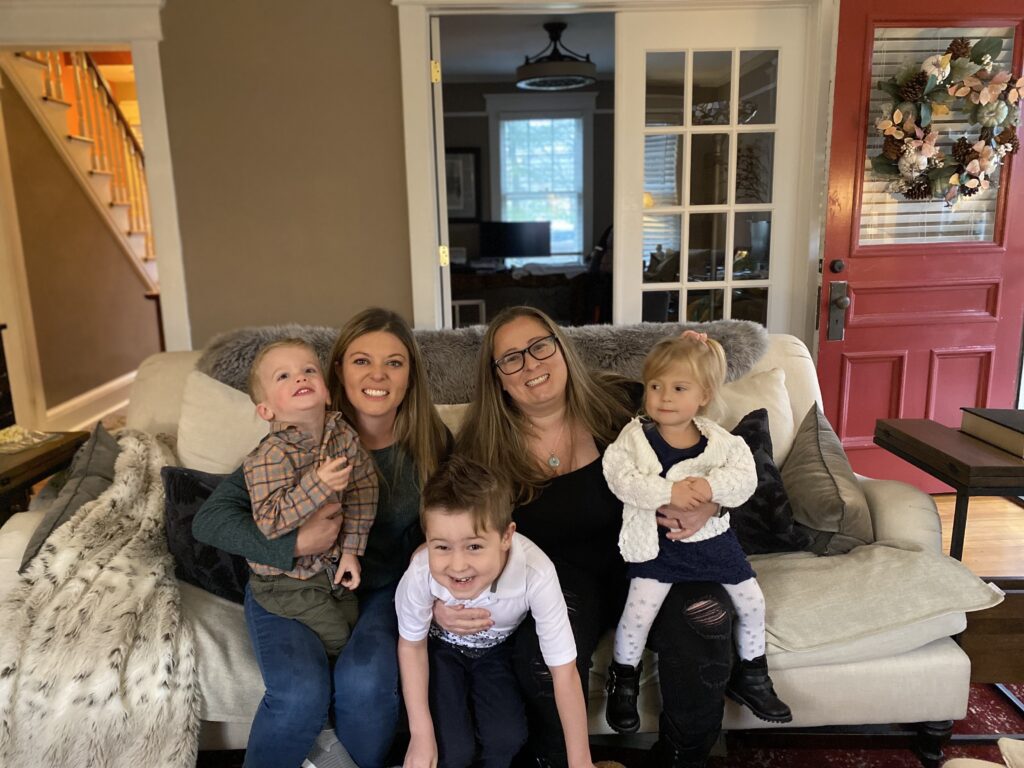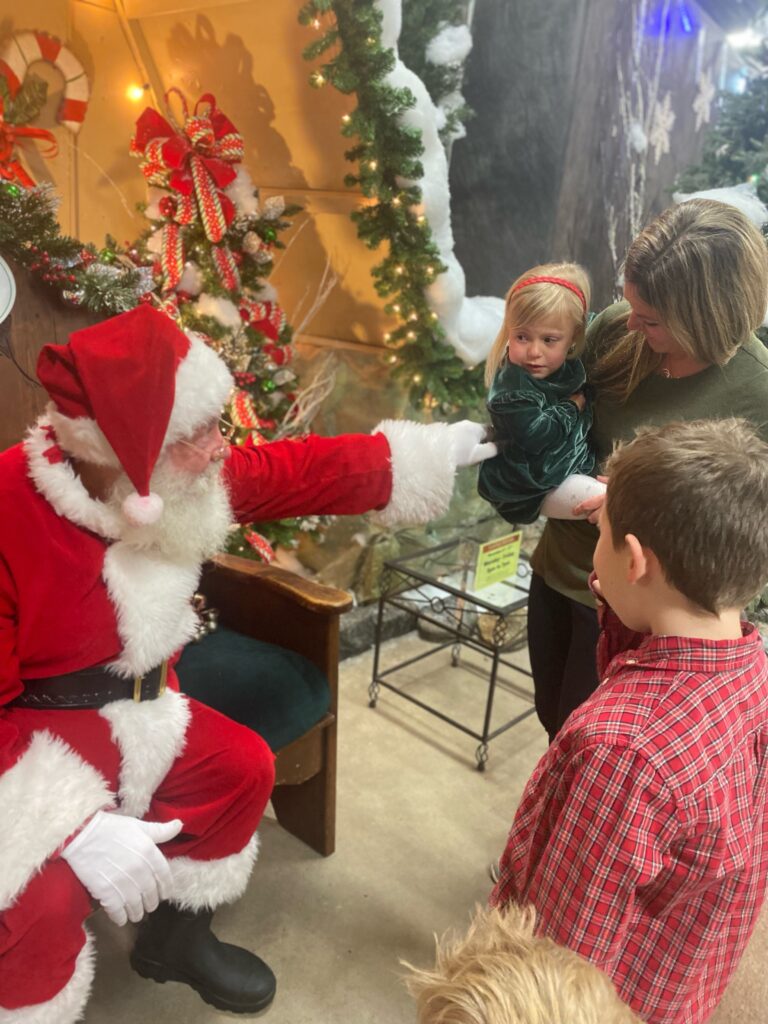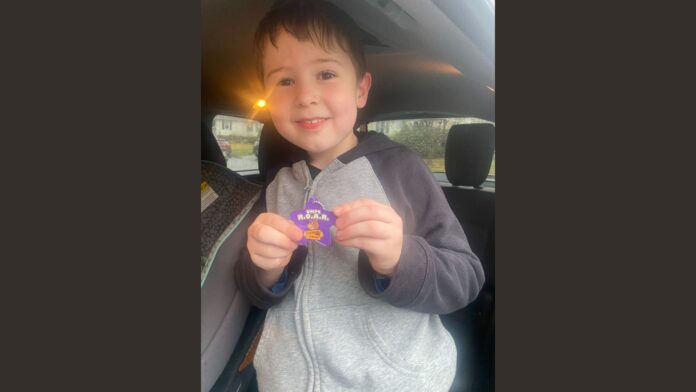For the past few weeks, every night at bedtime, Jackson elbows his twin siblings out of the way as they all jockey for position to be first in line to get up to the bathroom and brush their teeth. “Me first!” “I’m first!” “Ow!”
It drives me and Ashlee insane. Being twice their age and size, Jackson always wins and yells “Me first!” as he jumps onto the stepstool at the sink. One particular night, like many before it, I had had enough and demanded August be first this time. Immediately, waves of hysterics began. As I helped August brush his teeth, Jackson crumpled onto the bathroom floor, screaming about how his brother is “alwaaaaays first.”
I tried reasoning with him, I tried ignoring him but the crying — and my overstimulation — were reaching new heights. Out into the hallway to play went the twins, I closed the door and, when I turned and saw Jackson sitting by himself, bawling on the step stool, I was struck by a reality: Sure, he’s being a royal pain in the ass, and is acting wildly ridiculous and self-centered — but he’s really just 6.
I decided to try one route I hadn’t yet — just give him a hug — and he went from feral, angry animal to a whimpering mess hugging me back. I suddenly saw beyond my annoyance and anger to really see him: This isn’t really about the teeth-brushing line. When I let my parental guard down — that one that tells you to not take no for an answer, to view misbehavior as willful disrespect — and chose to connect with Jackson instead of command him, I could actually glimpse the world from his vantage point.

A bathroom breakthrough
“Is this about the HERSHEY’S KISS?” I asked. “Yes!” Jackson replied, crying harder into my shoulder.
Earlier that night, August had peed on the potty for the first time. And I had a celebration! His twin sister has been using the potty like a pro for months, but the most he’s done is sit on it and make a “Pssss” noise and laugh. So, when he actually was successful, there was cheering, clapping, calling family members and a HERSHEY’S KISS.
Immediately, of course, Jackson started clamoring for his own and I explained that they’re only for potty training prizes — and he had months of them all to himself before the twins were born. I brushed off his protests with “It’s fine” and “Stop being silly.”
While he cried in the bathroom, I rethought that interaction — not from the condescending, judgemental point of view that I may gravitate toward when one of my kids is exhibiting stereotypical “bratty” behavior but from a place of genuine curiosity. What must that feel like, to be 6 — with logic and reasoning skills years from being fully formed, in the midst of trying to understand concepts of fairness and equality, with an outsized ego — and to have a parent seemingly doting on a sibling and dismissing your voice that you’ve been encouraged to use?
The reality of Jackson’s point of view hit me in that moment: He didn’t remember all those HERSHEY’S KISS when he was 3; but what he may have remembered was the attention and affection that used to be showered just on him. And the many times that those moments of connection have now morphed into “Jackson, hold on,” “Jackson, leave your brother alone,” “Jackson, calm down,” “Jackson, be quiet.” Or the feeling of displacement as he sits on the couch doing homework or playing his Nintendo Switch while his little siblings run to the door and soak up the love of visitors that used to be first doled out on him.
It’s not that he wanted the HERSHEY’S KISSES that much — or to be first in line for brushing his teeth (I mean, really, how fun is brushing your teeth anyway?): He just wanted to feel special. So, I voiced that hypothesis and I could tell instantly I hit a nerve: “You don’t think I’m special anymore — and I even have two paw prints!”
When Jackson got off the school bus that day, the first thing he blurted out was how he was awarded his second “paw print” at school: a symbol of the school mascot given to kids doing an exemplary job of listening and showing respect. One more paw print and he got a coveted keychain. While I congratulated him and handed down a “Great job, bud!” I was quickly distracted by August hopping off the tricycle and running into the street and Avery clamoring to be picked up.
As I hugged him in the bathroom, I cried right into his hair as I replayed that interaction and the rest of the afternoon: yelling at him to stop being too rough, too loud, too hyperactive with his siblings; spending all of dinner racing between August’s and Avery’s seats helping them cut their food and coming up with games to get them to eat while he ate his dino nuggets quietly on the other side of the table; quickly shutting down his favorite show as the evening’s TV pick because the twins don’t like it.
Taken on an individual basis, each of these experiences would typically have me thinking, “He needs to suck it up.” “He can’t always be the center of attention.” “I don’t want him to be spoiled.” But when I truly shifted my perspective and saw the totality of that context the best I could from a 6-year-old’s vantage point — recognizing how different his perspective, his emotional capability, his understanding of the world around him really are from mine — it all made sense.

The power of perspective-shifting
So often as parents, we’re living in the moment, and not in the good way: It’s all about completing the task at hand — getting through dinnertime, packing lunches, bedtime routines — which makes it tough to ever take a time out and look at the big picture. Trying to do so from someone else’s point of view is exponentially harder.
I’m realizing that perspective-shifting is something I have been craving as a parent. Ashlee and I often talk about how, as moms of twins, we wish people could really get it — beyond the “Twins must be hard,” “You have your hands full,” etc. “Ya’ll don’t even know,” I often think in response. But I do want them to know: the skin-crawling feeling of a sticky toddler hand on your arm following 12 hours of being constantly touched, the emotional disarray after being constantly called to do things for three kids at once, the mental load of mothering that sends your blood pressure climbing all day. Sometimes, I even find it hard to convey to Ashlee what a particularly hard day with the kids is like when she’s at work; we each bring our unique lived experiences to how we understand one another’s circumstances.
Yet, shared understanding can make those burdens lighter. But it takes more than stepping into someone else’s shoes to truly shift perspective: it’s about putting on their entire outfit, feeling the temperature in the room, knowing what they ate for breakfast. Attempting to do that with Jackson showed me that he may be the big brother but he’s still a child and, like any child, he wants to be celebrated, to feel special — especially when those around him often are.
So, I acknowledged that I can do a better job of making Jackson still feel special (while cautioning him about things not always being equal and even with his siblings). I noticed the dynamic in the bathroom shifted even when I closed the door, letting him know he had my undivided attention (and the twins loved the extra playtime before bed!). We decided we’d simply take turns for teeth-brushing night by night, and I was pleasantly surprised how excited he was the next night to tell August it was his turn to go first. The morning after our bathroom breakthrough, I tossed Jackson a HERSHEY’S KISS on his way to the bus, and told him I couldn’t wait until he got his third paw print, that we were going to throw a party. “Really, a party?” he asked as he walked backwards toward the bus. We had to adjust expectations a bit there, but his smile told me he felt seen.
I’m trying to coach myself into perspective-shifting with all the kids. Avery is in the phase of believing that Santa Claus is sent straight from hell; she even runs screaming when his likeness shows up in cartoon form on the television. Sure, ridiculous — but my newfound commitment to try to think and feel like my kids do stopped me from forcing her to sit on the big guy’s lap to get a humorous picture of her screaming to show her when she’s older. He’s a giant stranger in a world that is very small to her; this year, we settled for a photo of him waving to her from a safe, socially distant space.
August, meanwhile, has leaned into a phobia of doctors (he had vaccines at his pediatrician a few weeks ago). On the nearly hour-long ride to the eye doctor earlier this month, he must have said “I no want to go to eye doctor” no less than 65 times. My eye was twitching by the time we got there, but I kept trying to remind myself that he doesn’t know one doctor from the next, and is being carted off on a long car ride where painful needles very well could be awaiting him.
Shifting my perspective has helped me both understand and connect with my kids more. A few days after our bathroom talk, Jackson got off the school bus and I could tell rhe was bursting to tell me something right away. He was unzipping his schoolbag already as he walked over and blushing, and yanked out the keychain he received for earning his third paw print. And I had a celebration! I made him hold it up so I could take a picture to send to Ashlee at work and asked for a play-by-play of exactly what he did to earn the prize. When we picked August and Avery up from daycare a few minutes later, I heard him crouch down to Avery as she ran to hug him and say, “Guess what? I have to show you: I got a keychain!” That night, he proudly affixed his keychain to the zipper on his schoolbag.
Of course, it’s just a piece of plastic; but the fact that we made a big deal out of his earning it is what gave it its meaning, driving home just how much potential we as parents have for shaping how our kids see the world and themselves. And all we need to do to live up to that potential is try to see the world from their eyes.

